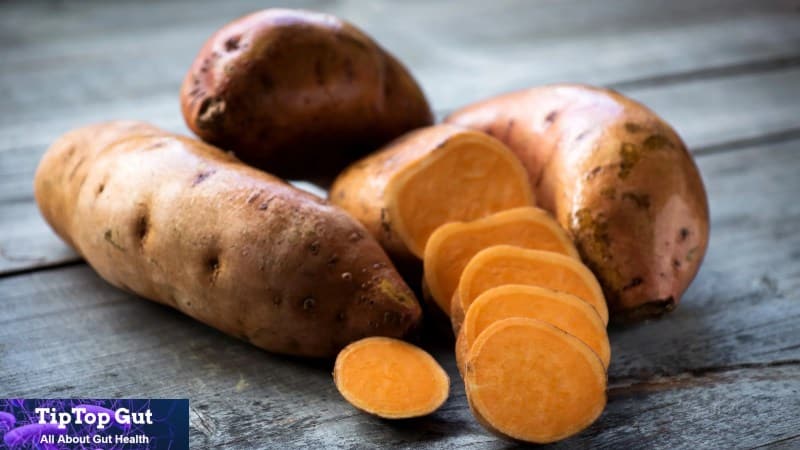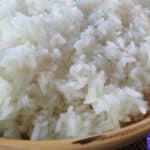Sweet potatoes are well known for their nutritional value. They are abundant in the antioxidant beta carotene, which the body converts to Vitamin A, and are crucial for healthy hair, skin, nails, and bones.
They are also a great source of Vitamin B6 (an excellent energy booster) and Vitamin C, which is especially important at this time of year when the cold weather and shorter days weaken our immune systems.
Are sweet potatoes good for gut health? Let’s explore the truth.
Sweet Potatoes: Delicious Snacks
Root vegetables with starches include sweet potatoes. They specifically grow on the roots of a plant called Ipomoea batatas and are referred to as underground tubers. Sweet potatoes are farmed worldwide, but where did they first emerge from Mother Nature?
This issue has been under discussion among scientists for many years. While some insisted that the Thanksgiving tradition originated in North America, others needed to be more sure. According to research conducted by a paleobotanist at Indiana University in 2018, the sweet potato’s actual continent of origin is Asia, and it has been growing for a lot longer than previously believed.
Sweet Potatoes of Wide Varieties
There are many different types of sweet potatoes; however, most people only associate them with bright-orange spuds when they think of them. First, dry-fleshed and moist-fleshed sweet potatoes are separated into two major groups.
Dry-fleshed sweet potatoes feature lighter flesh from white to pale yellow, tan skin, and a starchier texture. These dry-fleshed sweet potatoes are more like “normal” potatoes than their cousins with moist flesh.
On the other hand, sweet potatoes with moist flesh have bright orange flesh and darker, reddish-brown skins, which is generally what comes to mind when you think of “sweet potatoes.” They have a sweeter flavor than dry-fleshed sweet potatoes, which may contribute to their popularity.
Around the world, sweet potatoes come in over 6,500 different varieties. Despite the fact that each of these types is distinctive, you’ll sometimes hear people group these sweet potatoes more generally based on their color, notably orange, white, and purple sweet potatoes.
Are Sweet Potatoes Good for Gut Health?
If appropriately prepared, sweet potatoes can also be great for our digestive system. We produce “resistance starch” by cooking and cooling them (in this example, freezing). You might consider resistant starch a superfood for your gut flora since, although we cannot digest it, the colony of beneficial bacteria in our large intestine is.
Not only does it feed the beneficial bacteria in this area of the digestive tract, but this digestion method also results in the production of a short-chain fatty acid (SFCA) called butyrate, which feeds the beneficial bacteria in our colons.
Eating resistance starch can also enhance insulin sensitivity, lower GI, decrease hunger, and reduce inflammation in our digestive tracts, among other advantages.
Green bananas, grains, seeds, legumes, and TigerNuts (one of my favorites) are additional excellent sources of resistant starch. It may also be made in rice and potatoes by cooking and cooling them (but not reheating them).
For best results, gradually introduce a small amount of resistant starch into your diet (mainly if you currently consume a diet low in fiber) to give your GI tract time to adjust to the new meal. Eventually, you can aim for 15–50 grams (two–four teaspoons) per day, but each person will have a different tolerance, so go slowly and steadily!
Read More:
Best Probiotic for Gut Health and Bloating: According to Health Experts
Other Health Benefits Sweet Potatoes
The sweet, starchy root vegetable known as the sweet potato is produced worldwide.
They come in several shapes and hues, including white, orange, and purple, and are full of fiber, vitamins, and antioxidants.
They are also simple to incorporate into your diet and offer several health advantages.
Here are some amazing health benefits of sweet potatoes.
Sweet Potatoes’ Fiber and Antioxidant Content
Sweet potatoes are beneficial for gut health since they include fiber and antioxidants. Insoluble and soluble fibers both exist in sweet potatoes. Your body cannot digest either kind. As a result, fiber stays in your digestive system and offers several gut-related health advantages.
Viscous fibers are a class of soluble fibers that absorb water and soften stools. Contrarily, non-viscous, insoluble fibers create bulk without absorbing water.
Some insoluble and soluble fibers can also be digested by the bacteria in your colon, resulting in short-chain fatty acids, which feed the cells in your intestinal lining and maintain their strength and health. Colon cancer risk has been associated with diets high in fiber, containing 20–33 grams daily, and more regular bowel movements.
Extremely Nutritious
A fantastic source of vitamins, fiber, and minerals is sweet potatoes. Roasted sweet potato with skin weighing one cup (200 grams) offers.
Possibilities of Fight Cancer
Numerous antioxidants found in sweet potatoes may give some protection against certain malignancies.
Anthocyanins, a class of antioxidants present in purple sweet potatoes, have been shown in test-tube tests to inhibit the growth of cancer cells from the bladder, colon, stomach, and breast.
Similar results were shown in rats fed diets high in purple sweet potatoes, which indicated that the anthocyanins in the potatoes might have a protective impact.
Test-tube experiments revealed the anti-cancer potential of orange sweet potato extracts and peels.

Encourage Vision Health
The antioxidant beta-carotene, which provides sweet potatoes with their vivid orange color, is incredibly prevalent in sweet potatoes.
One cup (200 grams) of cooked orange sweet potatoes with skin has more than seven times the daily recommended dose of beta-carotene for an adult. Your body uses vitamin A, formed from beta-carotene, to create light-detecting receptors in your eyes.
In developing nations, severe vitamin A deficiency is a problem that can result in a particular form of blindness called xerophthalmia. Beta-carotene-rich foods like orange-fleshed sweet potatoes may help avoid this disease.
Purple sweet potatoes also appear to offer advantages for vision. The anthocyanins they contain have been shown in test-tube tests to be able to shield eye cells from harm, which may be necessary for overall eye health.
May Improve Cognitive Function
Purple sweet potatoes may enhance mental performance. It has been demonstrated that supplementing mice with anthocyanin-rich sweet potato extract enhances learning and memory, presumably due to its antioxidant characteristics.
However, diets high in fruits, vegetables, and antioxidants are generally linked to a 13% decreased risk of mental decline and dementia. Human research to test these effects is lacking.
Potential Immune System Support
One of the best sources of natural beta-carotene, a substance derived from plants that your body converts to vitamin A, is orange-fleshed sweet potatoes.
A robust immune system depends on adequate quantities of vitamin A, and low blood levels have been associated with weakened defenses. Additionally, it’s essential for keeping your mucous membranes healthy, especially those that line your gut. Your body is exposed to various germs that could cause disease in the stomach. Consequently, a robust immune system depends on having a healthy gut.
Studies show that a vitamin A shortage worsens gut inflammation and impairs your immune system’s capacity to react correctly to dangers. Although no studies have been done to see if sweet potatoes affect immunity, eating them frequently can help avoid vitamin A deficiency.
Read More:
Biotics 8 Review: SCAM or A Legit Probiotic for Men?
How to Maximize the Nutritional Value of Your White Potatoes?
Potato preparation is essential. Even though white potatoes are a fantastic source of resistant starch, eating French fries with every meal may not be the healthiest option.
According to research, baking potatoes offers an advantage over boiling or frying them in terms of the amount of resistant starch they have. The cooling procedure is crucial to maximizing potatoes’ resistant starch.” The potatoes should be cooked and then allowed to cool for at least a few hours in the refrigerator before being consumed to obtain the most resistant starch.
The potatoes’ overall amount of starch increases throughout the cooling process, transforming resistant starch from easily absorbed carbohydrates. Rice or potatoes that feel a little “sticky” the next day after spending the night in the refrigerator are an example of resistant starch. That is the starch that is resistant.”
Adding Sweet Potatoes to Your Diet
It’s really simple to include sweet potatoes in your diet. You can bake, boil, roast, fry, steam, or pan-cook them and eat them with or without the peel.
They go well with various flavors due to their inherent sweetness and may be used in savory and sweet dishes.
Among the preferred methods for consuming sweet potatoes are:
- Peeled, thinly sliced sweet potato chips that are baked or fried.
- Fried or baked sweet potatoes that have been peeled, cut into wedges or matchsticks and served.
- Sweet potato toast: Cut into thin slices, topped with nut butter or avocado, then toasted.
- Sweet potatoes are peeled, boiled, and then mashed with milk and salt.
- Sweet potatoes are baked whole and cooked till soft when pierced with a fork.
- Hash is made from diced sweet potatoes and onions peeled and cooked.
- Sweet potatoes that have been cut into spirals, sautéed, then sauced.
- Sweet potato puree gives baked foods moisture without adding fat.
Beta-carotene can be better absorbed as a fat-soluble nutrient when sweet potatoes are prepared with a small amount of fat, like coconut oil, olive oil, or avocado.
Sweet potatoes are a great source of beta-carotene because they keep at least 70% of it even after cooking, despite a little reduction in content.
Concluding Now! Are Sweet Potatoes Good for Gut Heath?
The nutrient-rich root vegetable sweet potatoes are available in a range of hues. They are rich in fiber and antioxidants, which guard your body against free radical damage and support a healthy gut and brain.
Additionally, they contain a vast amount of beta-carotene, which is transformed into vitamin A and helps to boost your immune system and healthy vision.
Because of their versatility and ability to be served in sweet and savory meals, sweet potatoes are a fantastic carbohydrate choice for most people.
FAQs about Sweet Potatoes and Gut Health
Is it challenging to digest sweet potatoes?
Foods that are simple to digest include cooked potatoes of all sorts. Due to their high insoluble fiber content, which promotes regularity and speeds up digestion, sweet potatoes are extremely friendly to the digestive system.
Do sweet potatoes reduce inflammation?
Purple-fleshed sweet potatoes are believed to contain incredibly high concentrations of anti-inflammatory and antioxidant chemicals. When these compounds circulate through your body, free radicals, which are molecules that break down your cells, are balanced.
When is it inappropriate to eat sweet potatoes?
Throw away your sweet potatoes if they are leaking, mushy, discolored, odorous, or have a lot of sprouts. You may chop off the sprouted section, cook it, and eat it immediately if there are only a few sprouts and the sweet potato is still solid, or you can plant it!
Which sweet potato preparation is the healthiest?
Boiling sweet potatoes preserves more beta-carotene and improves the nutrient’s absorbability compared to other cooking methods like baking or frying. Up to 92% of the nutrition can be preserved by shortening the cooking time, such as by boiling something for 20 minutes in a tight-fitting lidded pot.
What effects does eating sweet potatoes every day have on your body?
You can get 400% of your daily vitamin A needs from one sweet potato. This supports the immune system, your body’s line of defense against infection, and the health of your eyes. Additionally, it benefits your reproductive systems and organs like the heart and kidneys.
Do sweet potatoes make you bloated and gassy?
However, sweet potatoes contain mannitol, a sugar that might aggravate gastrointestinal discomfort, bring on bloating, and stimulate diarrhea. You may have a mannitol intolerance if you experience symptoms after eating sweet potatoes frequently.
Can sweet potatoes help you poop?
Insoluble fiber, which can give stools more volume and help prevent constipation, is abundant in sweet potatoes.
Read More:
Is Fasting Good For Gut Health? Some Cool Facts Here
Is Keto Good for Gut Health? Surprising Facts Unveiled
Are Chia Seeds Good For Gut Health? Amazing Facts Revealed
Are Tomatoes Bad for Your Gut Health? Hidden Truth Unveiled!
Best Probiotic for Vaginal and Gut Health: The Best Guide 2022
Sources and References
At TipTop Gut, we rely on peer-reviewed studies, academic research institutions, and medical associations. We avoid using tertiary references.
-
Aune D, Chan DS, Vieira AR, Navarro Rosenblatt DA, Vieira R, Greenwood DC, Norat T. Dietary compared with blood concentrations of carotenoids and breast cancer risk: a systematic review and meta-analysis of prospective studies. Am J Clin Nutr. 2012 Aug;96(2):356-73. doi: 10.3945/ajcn.112.034165. Epub 2012 Jul 3. PMID: 22760559.
-
Ludvik B, Neuffer B, Pacini G. Efficacy of Ipomoea batatas (Caiapo) on diabetes control in type 2 diabetic subjects treated with diet. Diabetes Care. 2004 Feb;27(2):436-40. doi: 10.2337/diacare.27.2.436. PMID: 14747225.
- Ameny, M.A. and Wilson, P.W. (1997), Relationship between Hunter Color Values and β-Carotene Contents in White-Fleshed African Sweetpotatoes (Ipomoea batatas Lam). J. Sci. Food Agric., 73: 301-306. https://doi.org/10.1002/(SICI)1097-0010(199703)73:3<301::AID-JSFA726>3.0.CO;2-Z
-
West KP Jr. Vitamin A deficiency disorders in children and women. Food Nutr Bull. 2003 Dec;24(4 Suppl):S78-90. doi: 10.1177/15648265030244S204. PMID: 17016949.
- HealthLine
-
Mei X, Mu TH, Han JJ. Composition and physicochemical properties of dietary fiber extracted from residues of 10 varieties of sweet potato by a sieving method. J Agric Food Chem. 2010 Jun 23;58(12):7305-10. doi: 10.1021/jf101021s. PMID: 20509611.
- WebMD
- Harvard

















